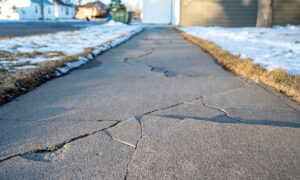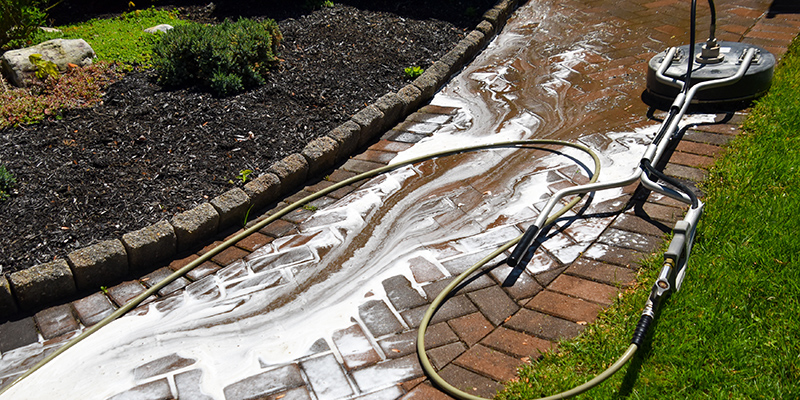HOA sidewalk maintenance is often a topic of debate in planned communities. But, who is really responsible for sidewalks? Is it the HOA, the homeowner, or the city? Let’s find out.
Who Is Responsible for HOA Sidewalk Maintenance?
Is the sidewalk in front of your house your property? If not, is HOA responsible for sidewalks or is the city responsible for sidewalk repair and maintenance? Unfortunately, there is no straight answer to this because it varies depending on the circumstances. In fact, HOA sidewalk repair and maintenance can even be shared responsibilities in some communities.
How do you know who repairs sidewalks in a homeowners association? The first thing to do is to check state law and local legislation. In large cities, the city is typically responsible for HOA sidewalk maintenance when they’re located on public roads. Meanwhile, if the road or sidewalk is private and located in a small town or suburb, it’s usually not the city’s responsibility.
In fact, some states have concretized this. For example, in the case of Qian vs. Toll Brothers, Inc., the New Jersey Supreme Court decided that private sidewalks are the association’s responsibility because they’re part of the common areas.
Check the Governing Documents
If the city is not responsible for HOA sidewalk maintenance, then the burden falls on either the HOA or the homeowner. To verify which of them holds responsibility, it’s imperative to check the governing documents. More specifically, homeowners and board members should check the community plat or map.
The governing documents may consider sidewalks as part of the community’s common areas. In that case, the association is responsible for the HOA sidewalk maintenance. The board needs to hire vendors for cleaning and snow removal to ensure they’re in good shape.
On the other hand, if the community plat considers sidewalks part of the owner’s separate interest, then the homeowner is in charge of maintaining them. They will need to hire vendors separately or maintain the sidewalks themselves.
Cause of Damage and Special Cases
 Sometimes, the lines may blur if someone else is directly or indirectly responsible for the damage caused to the sidewalk. For example, let’s say a homeowner planted a tree that damaged the sidewalk as its roots grew.
Sometimes, the lines may blur if someone else is directly or indirectly responsible for the damage caused to the sidewalk. For example, let’s say a homeowner planted a tree that damaged the sidewalk as its roots grew.
The sidewalk is considered part of the common areas and is the HOA’s responsibility. However, is the HOA still responsible when the homeowner was the one who planted the tree?
It also depends, again, on state law and the governing documents. Either of these may specifically address damage to HOA or a neighbor’s property. If they don’t, the outcome could change based on many different variables.
For instance, if the homeowner planted the tree on private property, the HOA may have grounds to pass the burden of responsibility to the homeowner. However, if the homeowner planted it in a common area with the board’s approval, it may remain the HOA’s responsibility.
On the other hand, it may not always be that simple. If the HOA left the tree alone for a long time without taking action against the homeowner, the resident may have a defense against the HOA. They could say the HOA sat on their rights for too long and that the homeowner has been prejudiced.
In the end, it will be on a case-to-case basis. If things are unclear, it’s best to consult with an attorney who specializes in these issues.
Why Is Clarifying Responsibilities Necessary?
It’s always important for homeowners and board members to clarify maintenance responsibilities in any community. Leaving it ambiguous could cause disputes in the HOA down the road. Moreover, if the residents think the HOA is responsible when it isn’t (or vice versa), the sidewalks can fall into disrepair. This could affect the community’s curb appeal and even compromise safety.
In addition, it’s best to clarify responsibilities to avoid legal liability. For example, let’s say it often snows in the community. An HOA responsible for sidewalks should maintain it regularly. But if the board is misinformed and believes it is the homeowners’ responsibility, they may face legal liability if someone slips and falls.
The same is true in the reverse. If the homeowners are unaware of their responsibility, they may face a surprise lawsuit if an accident happens. They may blame the HOA without knowing they are, indeed, the ones responsible. This could lead to conflict and multiple lawsuits that could have been avoided.
Maintaining HOA Sidewalks
If the responsibility falls on the HOA, it’s best to stay on top of sidewalk maintenance. As long as the homeowners association does its duty, it shouldn’t face too much liability if someone has an accident. Maintaining the sidewalks will also keep the homeowners happy.
What can the association do to maintain the sidewalks? Firstly, the board will have to inspect the community’s sidewalks for any cracks, damages, or landscaping issues. They need to address these problems as soon as possible to avoid accidents.
Afterward, the HOA must be proactive and schedule regular maintenance activities. They can hire cleaning services or snow removal vendors to regularly maintain the sidewalks. Moreover, they need to set aside a budget for sidewalk maintenance and adjust the assessments accordingly.
On the other hand, if the responsibility is on the homeowners or it is shared, the HOA should clearly communicate this with the community. The board should send reminders to the homeowners and work closely with them to keep the sidewalks in good shape.
Creating a Safe and Harmonious Community
 HOA sidewalk maintenance is often a source of conflict in common interest communities. However, HOAs can easily prevent fights from breaking out if they clarify who is responsible for what. This way, everyone is on the same page and knows what their responsibilities are.
HOA sidewalk maintenance is often a source of conflict in common interest communities. However, HOAs can easily prevent fights from breaking out if they clarify who is responsible for what. This way, everyone is on the same page and knows what their responsibilities are.
Are you an HOA management company or a self-managed homeowners association having trouble with community management? Condo Manager is your key to success. Our HOA management software has all the necessary tools you need to manage a planned community. Call us today at (800) 626-1267 or contact us online to learn more!
RELATED ARTICLES:
- How To Remove An HOA Board Member Or Officer?
- Should You Or Should You Not Have An HOA Pool Lifeguard?
- HOA Disaster Management: Preparing For The Worst



